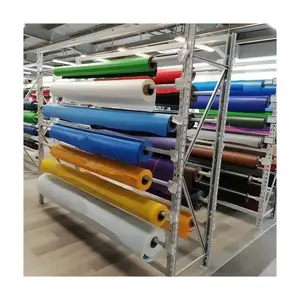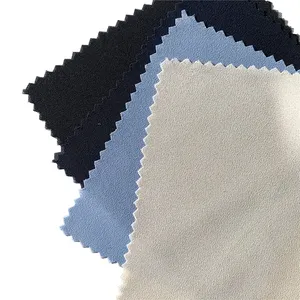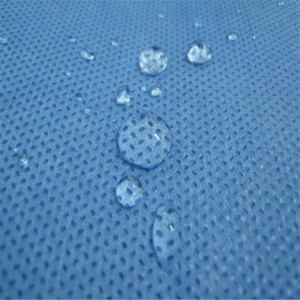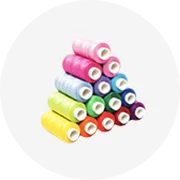What are Polypropylene Fabric
Polypropylene fabric is a nonwoven textile made from the thermoplastic polymer polypropylene. Renowned for its durability and resistance to various chemical solvents, acids, and bases, this type of fabric has become a staple in various industries. It is particularly favored for its lightweight nature, breathability, and ability to repel water, making it an ideal choice for a multitude of applications ranging from medical use to agriculture.
The production of polypropylene fabric typically involves the process of spinning polypropylene into fine threads which are then bonded together through various techniques such as thermal bonding, mechanical entanglement, or chemical bonding. This results in a versatile fabric that can be made with different properties by manipulating the bonding process and the density of the threads. These properties may include anti-static, tear resistance, and UV protection among others.
Polypropylene fabric is often used by businesses that require materials that are both cost-effective and offer high performance. Its durability and ease of cleaning make it an attractive choice for reusable items, while its disposability is essential for products such as hygiene masks or filters. The principles behind polypropylene fabric revolve around providing a material that serves practical functions while maintaining affordability and adaptability to various commercial needs.
Types of Polypropylene Fabric
Polypropylene fabric comes in several different forms, each serving unique purposes across various domains:
Spun-bonded Polypropylene: This is one of the most common types of polypropylene fabric where continuous filaments are spun and then bonded by heat to form a fabric. It's widely used in the hygiene industry for products like diapers and sanitary pads due to its softness and breathability.
Melt-blown Polypropylene: Featuring a fine fiber-like structure, melt-blown polypropylene is known for its excellent filtration capabilities. It's commonly utilized in air and liquid filtration applications, including medical masks and HEPA filters.
Needle-punched Polypropylene: This type involves mechanically orienting and interlocking the fibers to add strength and stability. It’s often found in automotive applications and geotextiles due to its high durability and resistance to stress.
Thermal-bonded Polypropylene: By using heat to bond fibers or powder, thermal-bonded polypropylene offers enhanced cohesion. It's useful in mattress covers and insulation because it can provide warmth without adding significant weight.
Hot air through Polypropylene: This technique involves using hot air to bond fibers, producing a bulkier and softer fabric. It's ideal for applications requiring comfort and breathability like personal care products.
How to choose Polypropylene Fabric
Selecting the right polypropylene fabric requires careful consideration of the intended use-case scenario alongside the specific attributes offered by each type of nonwoven fabric. Businesses should assess factors such as durability requirements, exposure to elements (such as chemicals or UV light), weight considerations, and permeability needs.
For those in the medical industry seeking materials for protective gear or sterile applications, melt-blown polypropylene with its superior filtration efficiency might be most appropriate. Agricultural businesses may prioritize spun-bonded or thermal-bonded types for their UV-resistant properties and strength to withstand outdoor conditions. Companies focused on consumer products such as apparel or home textiles might opt for hot air through or needle-punched fabrics due to their texture and resilience.
It's also critical to consider the environmental impact of these materials; eco-friendly options are increasingly available that offer biodegradability without compromising performance. When sourcing from Alibaba.com, businesses can filter search results by features such as water resistance, anti-bacterial properties, or specific nonwoven technics—tailoring their procurement process to find the most suitable polypropylene fabric for their needs.
Best Polypropylene Fabric on Alibaba.com
Alibaba.com stands out as a global marketplace that connects businesses with an extensive network of suppliers offering a wide array of polypropylene fabrics suited for all industrial needs. With over two decades of experience facilitating B2B trade across borders, Alibaba.com simplifies sourcing high-quality materials while ensuring buyer protection through services like Trade Assurance.
The platform's extensive product listings cater to diverse business requirements, emphasizing customization options that allow buyers to specify their desired features such as anti-static or waterproof properties. Whether a business is looking for lightweight materials for hygiene products or robust fabrics for agricultural use, they can find suppliers on Alibaba.com capable of meeting their specifications in terms of both quality and quantity.
Alibaba.com's user-friendly interface enables buyers to communicate with suppliers in their local language, arrange order handling efficiently, and navigate through thousands of product options with ease. With features designed to accommodate mobile users and businesses from over 190 countries, Alibaba.com exemplifies its commitment to "making it easy to do business anywhere," providing a reliable source for businesses worldwide to find the perfect polypropylene fabric solutions they require.
Common FAQs for Polypropylene Fabric
What is polypropylene fabric typically used for?
Polypropylene fabric is employed in a variety of sectors, including medical, agriculture, hygiene, industrial, and textiles. It's often used in applications that require durability, water resistance, and lightweight properties.
How is polypropylene fabric made?
The process generally involves spinning polypropylene polymers into fibers which are then bonded together using techniques like thermal bonding, needle-punching, or spun-bonding to create nonwoven fabrics with specific properties.
What are the environmental impacts of using polypropylene fabric?
Polypropylene is a plastic polymer and as such can have environmental impacts due to its slow degradation rate. However, there are biodegradable options available that aim to reduce these impacts.
Can polypropylene fabric be recycled?
Yes, polypropylene fabric is recyclable. It can be melted down and reformed into new fibers or products, contributing to a circular economy within the textile industry.
Is polypropylene fabric breathable?
Breathability can vary depending on the manufacturing process of the polypropylene fabric. For instance, hot air through or spun-bonded techniques can produce more breathable materials suitable for personal care items and apparel.
What certifications should I look for when sourcing polypropylene fabric for medical use?
For medical applications, certifications such as ISO 13485 for medical devices and relevant FDA approvals for contact with bodily fluids are important to ensure safety and compliance.
Are there different thicknesses available for polypropylene fabric?
Yes, polypropylene fabrics come in various thicknesses ranging from lightweight to heavyweight, which cater to different application needs like durability or flexibility.
How do I know which type of polypropylene fabric to choose for my application?
Selection should be based on the specific requirements of your application – such as strength, filtration needs, exposure to chemicals or UV light – as well as considerations around weight and environmental impact.
Can polypropylene fabric be printed on?
Certain types of polypropylene fabrics can be printed on using specific techniques designed to adhere to nonwoven materials. It's essential to choose a printing method compatible with the fabric's properties.
Is polypropylene fabric suitable for outdoor use?
Polypropylene fabrics with UV-stabilizing treatments are suitable for outdoor use as they are resistant to sun damage and weathering. Spun-bonded and thermal-bonded types are often used in agricultural and geotextile applications outdoors.
Can I order custom features like anti-uv or waterproofing in my polypropylene fabric?
Custom features such as anti-UV treatment or waterproofing can often be requested from manufacturers. Businesses should specify their requirements when negotiating with suppliers on Alibaba.com.
Does the color of polypropylene fabric fade over time?
Polypropylene is generally colorfast; however, prolonged exposure to UV light without proper treatment can cause some fading over time. Fabrics intended for outdoor use should have UV protection to minimize fading.
Are there any health risks associated with using polypropylene fabric in products?
Polypropylene is considered safe for use in many consumer products and has a high resistance to chemicals, making it unlikely to pose health risks when used appropriately. For medical applications, it's essential that the fabric meets health safety standards.
What nonwoven technics are available for polypropylene fabric on Alibaba.com?
Suppliers on Alibaba.com offer various nonwoven technics such as spun-bonded, needle-punched, melt-blown, thermal-bonded, and hot air through techniques that can be tailored to different application needs.





































 浙公网安备 33010002000092号
浙公网安备 33010002000092号 浙B2-20120091-4
浙B2-20120091-4